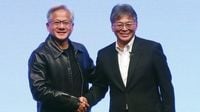In a move that could reshape the future of artificial intelligence and robotics, Japanese technology giant Fujitsu Ltd. and U.S.-based Nvidia Corp. have announced a sweeping strategic partnership aimed at creating a full-stack AI infrastructure. The collaboration, revealed at a press conference in Tokyo on October 3, 2025, unites two industry leaders in an ambitious bid to accelerate AI adoption across healthcare, manufacturing, robotics, and beyond.
Standing side by side on stage, Fujitsu CEO Takahito Tokita and Nvidia CEO Jensen Huang painted a vision of a world powered by intelligent agents—software entities that can interpret instructions and execute complex, multi-step tasks. "Computing power accelerates the progress of AI," Tokita told reporters, emphasizing the urgency of building robust infrastructure to support the next generation of AI-driven innovations. Huang, echoing the sentiment, declared, "The AI industrial revolution has begun, and we must build the infrastructure to power it—in Japan and across the globe." According to the Associated Press, Huang even hugged his Fujitsu counterpart, underscoring the collaborative spirit behind the announcement.
The heart of the partnership lies in integrating Fujitsu’s central processing units, including the FUJITSU-MONAKA CPU series, with Nvidia’s world-leading graphics processing units (GPUs) and networking solutions. These GPUs, renowned for their prowess in parallel computing, are the engines behind most modern AI model training and inference workloads. The companies plan to connect these technologies using Nvidia’s NVLink Fusion, a high-speed interconnect designed to enable seamless data flow and performance scaling. The goal is nothing short of transformative: to deliver AI agents and infrastructure that continuously learn, adapt, and improve, driving an industrial revolution for the digital age.
Fujitsu has set its sights on establishing this AI infrastructure in Japan by 2030, with an eye toward global expansion. "By combining the cutting-edge technologies of both companies, we will develop and provide full-stack AI infrastructure, starting with sectors such as manufacturing where Japan is a global leader," Tokita said in a press release, as reported by PR Newswire. The partnership will also explore high-performance computing and quantum technologies, signaling a commitment to staying ahead of the curve as AI capabilities evolve.
The collaboration comes at a time of surging global demand for AI hardware. Nvidia’s dominance in the GPU market is well established, commanding 90% of the data center GPU segment, according to industry reports cited by MoneyCheck. The company’s market capitalization has soared to over $4.5 trillion in early October 2025, reflecting investor confidence in its ability to shape the future of AI. Nvidia shares edged up 0.5% to $189.73 in premarket trading on Friday, extending Thursday’s gains, as excitement around AI infrastructure investments continues to build. Rival chip makers like Advanced Micro Devices and Broadcom also posted gains, riding the same AI-driven wave.
Management at Nvidia projects that global data center spending will skyrocket from $600 billion in 2025 to as much as $3-4 trillion by 2030, a forecast that underscores the scale of the coming transformation. Major technology companies are already coordinating directly with Nvidia to secure chip allocations for their own data center projects, a testament to persistent supply constraints and the critical role of GPUs in the AI ecosystem.
For Fujitsu, the partnership with Nvidia represents a major step forward in its efforts to push AI into new frontiers. The two companies will jointly develop platforms tailored for industry-specific AI agents, focusing initially on healthcare, manufacturing, and robotics. These AI agents, as described by MoneyCheck, are sophisticated software entities capable of interpreting simple instructions and executing complex, multi-step processes—unlocking automation and decision-making capabilities previously out of reach for many businesses.
The collaboration also includes a partnership with Japanese robot maker Yaskawa Electric Corp., aiming to deliver smart robots powered by advanced AI robotics technology. According to Jinse Finance, this aspect of the partnership is designed to enhance enterprise competitiveness while maintaining autonomy in AI applications. The hope is to address pressing social challenges, such as Japan’s aging population and labor shortages, by leveraging digital twins and robotics to streamline manufacturing and operational processes.
Tokita, in remarks reported by the Associated Press, stressed the importance of a "human-centric" approach: "Through our collaboration with Nvidia, we aim to create new, unprecedented technologies and contribute to solving even more serious social issues." The vision is for a human-AI co-creation cycle, where high-speed AI computing works hand-in-hand with human judgment and creativity. This approach, proponents argue, will not only automate repetitive tasks but also stimulate innovation and enhance competitiveness across all sectors.
Jensen Huang, for his part, sees the partnership as a chance for Japan to reclaim its leadership position in technology. "Japan can lead the world in AI and robotics," he told reporters, highlighting Fujitsu’s longstanding expertise in supercomputing, quantum research, and enterprise systems. The two executives did not disclose specific financial terms or investment figures, but the scale of the initiative—and the companies’ track records—suggests a significant commitment of resources and talent.
Industry analysts note that the collaboration could serve as a template for other countries and companies seeking to harness the power of AI. By focusing on full-stack solutions that combine hardware, software, and industry expertise, Fujitsu and Nvidia are betting that integrated platforms will be key to unlocking the next wave of AI-driven transformation. The companies also emphasize the importance of enterprise autonomy, ensuring that businesses retain control over how AI is deployed and managed within their organizations.
The announcement comes amid a broader trend of Japanese firms partnering with American technology leaders to accelerate AI development. Hitachi Ltd., for example, recently announced a partnership with OpenAI, the creator of ChatGPT, to explore AI applications in various industries. These collaborations reflect a recognition that the challenges and opportunities of AI are global in scope—and that cross-border cooperation will be essential to realizing its full potential.
As the race to build AI infrastructure heats up, the stakes could hardly be higher. The promise of intelligent agents, self-evolving systems, and automated factories is tantalizing, but the challenges are formidable. Supply chain constraints, regulatory hurdles, and the sheer complexity of integrating disparate technologies all loom large. Yet, as Tokita and Huang made clear, the alternative—falling behind in the AI revolution—is not an option for companies or countries hoping to remain competitive in the decades ahead.
With the groundwork now laid, all eyes will be on Fujitsu and Nvidia as they work to turn their ambitious vision into reality. If successful, their partnership could mark a turning point not just for Japan, but for the global AI landscape, ushering in an era where human ingenuity and artificial intelligence work hand-in-hand to solve some of society’s most pressing challenges.


